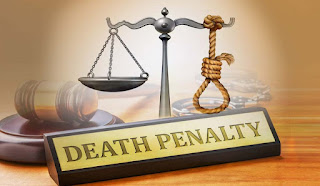Why the death penalty should be scrapped
A Cape Coast High Court has ruled that Bright Ellis, a 27 year old, be hanged for the murder of a Cape Coast-based musician called Emmanuel Aikins. Sentences like this are froth with unease for so many people including me.
The subject of Capital Punishment is one that garners a lot of legitimate polar opposing arguments. Those who argue in favor of the death penalty believe in its satisfying purity of indignation. A case of an eye for an eye; where anyone who takes the life of another should have theirs taken as well. Those on the other fringe of the spectrum believe death sentences could possibly put a wrongly convicted person on death-row.
If you’re fond of legal dramas like me, you may be familiar with some of the nitty gritty of the courtroom even if you don’t have any legal background. And if you don’t like legal dramas, you probably will have at one point or another come across information concerning courtroom proceedings. And you would have very much learned that a number of issues could go wrong with the delivery of Justice. Of course real-life situations do not look anything like a well crafted fiction, where the good guys always go free and the bad guys get punished in the end.
The point is, not everyone arrested, charged, tried and convicted of crimes are necessarily guilty of those crimes. This could be attributed to a lot of things such as bad/inadequate representation, incompetent forensic analysis, witness misidentification and even outright perjury by witnesses among several other things. Either one of these or a combination of two or more could lead to a grievous miscarriage of Justice.
One of the strong arguments that are made in support the assertion that everyone is entitled to a legal counsel no matter how heinous the crime(s) they have committed, is to protect innocent people from imprisonment without a fair trial. “It is better that ten guilty persons escape than that one innocent suffer” so says William Blackstone. In the same vein, it’s better that ten guilty people live than that one innocent killed.
All necessary evidence may have implicated Bright Ellis, but what happens in the case where an innocent person is framed beyond a reasonable doubt? The list of Justice-gone-awry cases are inexhaustible. In 1975, a Ghanaian called Kwame Ajamu was wrongly convicted and sentenced to death for murder in Cleveland, Ohio. After 27 years in prison, the truth came to light and he was was released on parole. The Dreyfus Affair, The Roscettti Four and so many other cases demonstrate why the death penalty should be scrapped.
The position of Amnesty International that “the death penalty violates the most fundamental human right—the right to life—and that it is the most ultimate cruel, inhuman, degrading and discriminatory” should be heeded. In reality, with the death penalty, you can only kill the murderer you cannot kill murder.
The calls to scrap the death penalty does not in any way seek to devalue the lives of victims or give preeminence to the lives of murderers. Besides preserving the most sacred right of the human person, it also seeks to avert the most unsavory situations of condemning innocent people to death.






Comments
Post a Comment